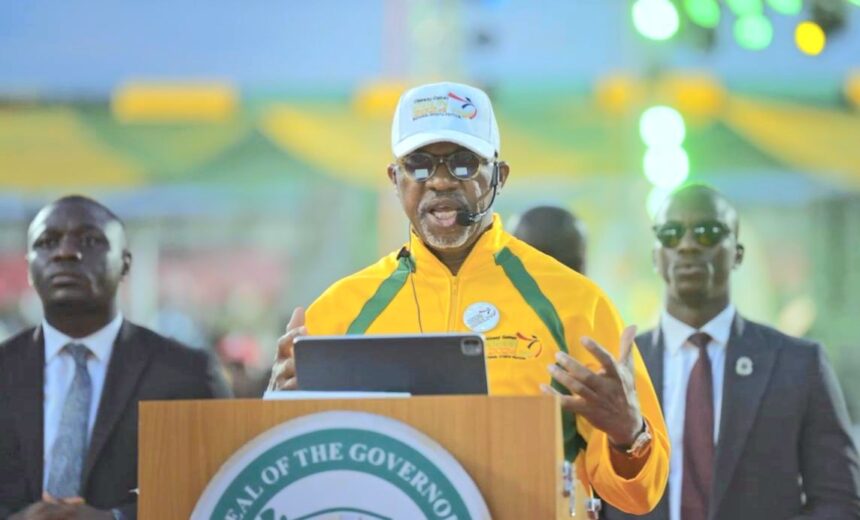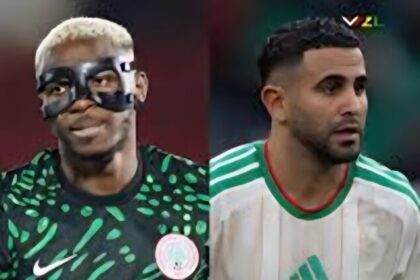– Stakeholders commend Ogun Governor for Hosting Masterpiece of Unity, Empowerment, and National Pride
● With KWAM 1, Wande Cole and Waje leading the chorus, Ogun gave Nigeria a closing worth its gold
The stars have dimmed in Abeokuta’s sporting sky, but only because they have now taken root in memory, flaming on in the hearts of those who danced, ran, sang, and soared beneath them. On this hallowed day of May 29, 2025, Ogun State drew the curtain on a National Sports Festival like no other, one that crowned unity, glorified excellence, and immortalised Governor Dapo Abiodun as both maestro and mason of a new sports renaissance in Nigeria.
What began as a symbolic torch passed into Governor Abiodun’s hands weeks ago, culminated in a roaring ovation beneath the shimmering sky, as King Wasiu Ayinde Marshal (KWAM 1) and the velvet-voiced Waje transformed the closing ceremony into a musical coronation. Their pulsating rhythms wrapped around the stadium like a hymn of gratitude—an exclamation mark on what now stands as the most elegant and impactful National Sports Festival in the annals of Nigerian history.

A Festival Crowned in Music and Meaning
To call it a sports festival would be a half-truth. No sports festival in recent Nigerian history has been as artistically resonant or emotionally stirring as the 22nd National Sports Festival hosted by Ogun State. It was more than a display of athletic prowess, it was a celebration of the soul of the nation, draped in melody and enriched by meaning. The musical spine of the event gave it a pulsating heart, uniting athletes and spectators in a rhythm of shared joy and national pride. At the closing ceremony, King Wasiu Ayinde Marshal (KWAM 1), the undisputed monarch of Fuji music, led the evening in a hypnotic spiral of sound, his voice echoing across the MKO Abiola Stadium like a blessing from Ogun’s ancestral spirits. Joining him was the velvet-voiced Waje, whose emotive ballads and electrifying stage presence thrilled thousands in attendance and sealed the Games in anthemic brilliance.
This grand finale was no afterthought, it was a deliberate act of symbolism. It harkened back to the festival’s majestic opening, where Asa—graceful and grounded—ushered in the event with poetic dignity, and Davido—Nigeria’s global ambassador of Afrobeat—set the tone with vibrant optimism. These performances stitched together a cultural tapestry that elevated the event from a tournament to a national theatre of identity and excellence. The festival, thus, became a rare harmony between the physical and the spiritual; between sport and song; between the sprint and the serenade.
Music here was not a mere embellishment. It was the carrier of history, a bridge across generations, and a balm for the country’s fractured soul. It softened the competitive edges, enhanced camaraderie, and crowned the festival with an emotional resonance few sporting events have ever achieved. Even the choreography of dancers, the visual aesthetics of costumes, and the orchestration of lighting and sound converged into a spectacle so entrancing it drew gasps and tears.
In these performances, Governor Abiodun gave Nigeria a mirror to see not only its differences but its harmony, not only its divisions but its power to rise above them through beauty and shared humanity. It was this rare fusion of meaning and celebration that made the 22nd National Sports Festival a national love song, one whose echo will resound long after the last whistle has blown.
Music met motion. Rhythm waltzed with resilience. And sports, that timeless language of the human spirit, was spoken in the most eloquent dialect of unity and national pride.

A Governor Who Staged a Masterpiece
Abiodun, the architect of this grandeur, pulled all the stops. The games were not just won on the tracks and in the rings, they were etched into policy, amplified through infrastructure, and enriched by innovation. With a statesman’s foresight and an artist’s attention to detail, he turned Ogun State into Nigeria’s new epicenter of athletic hope and hospitality.
No fewer than 10,000 athletes, coaches, and officials descended upon the Gateway State. What they met was not just efficiency—but warmth. Not just facilities—but flourishing. From seamless logistics to glittering stadia, from medical readiness to media savvy, Ogun put up a festival that met international standards and surpassed national expectations.
To describe Governor Dapo Abiodun merely as a host would be to diminish the scale of his vision and the elegance of its execution. What he staged in Ogun was a masterpiece, an operatic celebration of sports, unity, and aspiration, conducted with the precision of a maestro and the heart of a patriot. Every detail of the 2025 National Sports Festival bore his signature: from the grand arenas to the smallest volunteer booth, from the intricate opening and closing ceremonies to the efficient shuttling of athletes and guests across venues.
Abiodun approached the festival not as a logistical challenge but as a cultural opportunity, a rare moment to burnish Ogun’s profile, reimagine Nigeria’s sports philosophy, and cast a spotlight on the state’s hospitality, history, and development strides. He spared no resource and held nothing back. He assembled committees of excellence, partnered with private investors, and ensured infrastructural readiness that transformed Ogun into a seamless host. Roads were rehabilitated. Stadiums were refurbished. Dormitories were expanded. Security was heightened. Everything—from power supply to medical care, worked in harmony, a rare feat in the annals of Nigerian mega-events.
But perhaps more than infrastructure, it was the ethos of the Games under Abiodun that elevated it. The tone was dignified yet joyful. The branding was proud yet inclusive. Athletes were not just treated as competitors but as ambassadors of their respective states. Coaches and officials were accorded full respect. The media enjoyed access and organisation. Visitors left with the sense that they had witnessed something profound, and that Ogun was no longer merely a state in southwestern Nigeria, but a stage on which a new national spirit had been rehearsed and revealed.
The Economic Crescendo: Beyond Medals and Memories
Behind the cheers, the medals, and the floodlights of the stadiums lay an even more resonant story—one of economic bloom, empowerment, and strategic foresight. The 22nd National Sports Festival was a financial tonic for Ogun State, spurring a crescendo of economic activity across multiple sectors. From Abeokuta to Ijebu-Ode, hospitality revenues soared. Hotels recorded full occupancy weeks ahead of the Games. Restaurants witnessed surges in demand. Artisans, transport workers, vendors, event planners, security firms, and local tour guides experienced a boom previously unknown.
Governor Abiodun knew that a tournament of this scale was not just a sporting duty but an economic opportunity. He worked tirelessly to link the festival to Ogun’s broader development strategy—encouraging local entrepreneurs to scale up, empowering small businesses to serve athletes and fans, and promoting Ogun’s tourist destinations like Olumo Rock to visitors. For many artisans and SMEs, the Games served as an entry point into Nigeria’s larger economic ecosystem.
The multiplier effect rippled across sectors. Farmers and food suppliers saw spikes in demand. Textile merchants cashed in on branded merchandise and team uniforms. The creative industry—from drummers to dancers, from lighting engineers to makeup artists—found rare employment. Transport logistics firms and ride-hailing services made fortunes. Even digital startups leveraged the Games to offer solutions ranging from athlete tracking to merchandise delivery.
Redefining Nigeria’s Sports Architecture
In a country where sports administration is often marred by bureaucracy and mediocrity, Dapo Abiodun stood as a revelation. His blueprint offered more than tournaments—it offered transformation. By investing in grassroots engagement, building world-class infrastructure, and mainstreaming sports into Ogun’s development matrix, he declared boldly: Nigeria can do better—and Ogun will lead the way.
The ripple effect was instant. New talent discovered. Local coaches trained. Youthful aspirations rekindled. And perhaps most importantly, national unity deepened.
A Cultural Torchbearer for Africa
If the festival showcased Nigeria’s prowess, it also illuminated Governor Abiodun’s emergence as a cultural torchbearer for Africa. In a continent often struggling to tell its own stories, here was a leader who orchestrated a narrative of excellence, elegance, and empowerment—anchored in indigenous culture and globally competitive execution. The 22nd NSF was Africa’s moment to shine, and Ogun was its stage.
By fusing sports with music, heritage with technology, and local culture with international standards, Abiodun created a spectacle that resonated far beyond Nigeria’s borders. The carefully curated mix of Afrobeat, Fuji, and folk performances celebrated the diversity of African expression while showcasing Ogun’s capacity to host world-class events. African cultural diplomats, foreign media houses, and development partners took note.
Abiodun’s cultural diplomacy was intentional. He understood that every athlete, every song, every stage backdrop was a soft-power tool—a way of positioning Ogun as not only a Nigerian powerhouse but a continental beacon. In a world where perceptions shape partnerships, Ogun’s image now gleams brighter in the global consciousness.
Redefining Nigeria’s Sports Architecture
In a nation where sports development has often been relegated to the margins of policy, Governor Abiodun’s hosting of the 2025 NSF was a masterstroke in reclaiming its centrality. He did not see sports as a frivolous afterthought or a seasonal pastime. He recognised it as a powerful tool for youth development, social cohesion, national branding, and economic advancement. And so, he treated the Games not as a one-off spectacle, but as part of a long-term strategy to redefine the architecture of sports development in Nigeria.
Under his administration, sports was not an isolated ministry but a cross-sectoral force. Education, youth empowerment, infrastructure, tourism, commerce, and health all intersected through the planning and execution of the festival. Training centres were upgraded. Talents were discovered. Data was collected for long-term athlete development. The state is already working on retention strategies to support emerging athletes post-festival and integrating them into scholarship and mentorship pipelines.
Even the emphasis on aesthetic and media presentation showed a deep understanding of sports branding. Ogun wasn’t just creating athletes—it was shaping icons. The Governor’s narrative strategy elevated the Games into a story of national pride. From the festival mascots to the songs, logos, and social media campaigns, every touchpoint exuded a professionalism and polish often missing in Nigerian sports events.
Legacy Cast in Flame and Applause
As the curtain fell today, there was no sadness, only a satisfaction so deep it hummed beneath the cheers. The festival had ended, yes, but its legacy had just begun. The torch was extinguished, but the light remains. The music faded, but its echoes will linger in the hearts of all who witnessed this miracle of muscle and melody.
Governor Abiodun’s legacy now looms larger than stadiums and scoreboards. It rests in the empowered dreams of young athletes. In the renewed pride of the Ogun people. In the unity rekindled across Nigeria’s six geopolitical zones. It rests in the belief that, when properly led, a simple game can birth a national renaissance.
Today, as the last medal was awarded and the final firework faded into the dusk, Ogun stood taller than ever before—its name etched in golden alphabets on Nigeria’s scroll of sporting greatness. This was not just a tournament. This was a testament. A triumph. A legacy of one man’s belief in the boundless power of sport to heal, to unite, to prosper.
Governor Abiodun, Ogun salutes you. Nigeria applauds you. Africa watches in admiration. And the world, now aware of your grand vision, waits for what next you will build.
For if this was a sports festival, what will a revolution look like?




